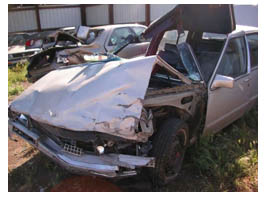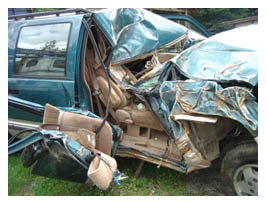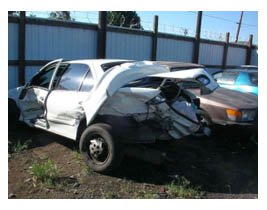Ask an Attorney a Question for FREE!
Total Loss
Insurance companies have all the tools to make you take a lower settlement, beware!
The insurance company will declare your car a total loss if and only if they believe they can save money. If settling your total loss requires less money than what they would spend fixing your car, then they will declare your car a total loss. It truly is a business decision.
In some instances, you could have a high-speed impact, which ends up totaling a vehicle that has a lot of value or worth (i.e. newer vehicles).
However, there are instances when you could end up totaling a car in a simple, low-speed, fender bender.
 The entire process depends on the actual value of your car, and not so much on the amount of damages. An expensive vehicle is much more difficult to declare a total loss than an inexpensive one.
The entire process depends on the actual value of your car, and not so much on the amount of damages. An expensive vehicle is much more difficult to declare a total loss than an inexpensive one.
The issues and problems with insurance carriers begin when they start determining the value of your car.
Insurance companies will tell you that they determined this final value, and will proceed with a final offer. However, I am going to ask you the following question - Who decides what is the fair value of your vehicle?
The answer is you! You must agree to a value. If you do not agree and sign over the title of your car (or the bank signs the title of your car), then there is no agreement and no settlement. Read this eBook on how to evaluate the value of your own car.
Consumers, however, try to defend themselves by bargaining, negotiating, and asking for an increase on the "final" offer.
The problem is compounded as insurance companies have all the tools necessary to make you take a lower amount than you are owed. This process is by no means an equal negotiation between the parties.
First, insurance carriers will cut your rental car as soon as the law allows them to (some carries will try to cut it even sooner than that). Fair enough, correct? Keep reading.

In some states, even if you have "full coverage" with rental coverage, the insurance company can stop paying your rental car as early as the day after they tell you that your car is a total loss (i.e. Texas). The great majority of states will allow for only three days after an offer is made.
The offer does not have to be to your satisfaction (or even reasonable, some might argue).
The insurance company can make a low offer to get you out of a rental car in three days (or less depending on your state), and pressure you to take a lower offer so you can go buy a replacement car.
The law in every state only talks about offers, but they do not include reasonable offers, or accepted offers.
Second, even if you believe that the offer is not too bad or that it is fair, then you only have one to three days (at most) to find a comparable replacement vehicle.
Many argue that this period of time is simply not enough to find a reliable vehicle.
This does not even include opportunity cost loss.
When you buy a car, you probably planned ahead, saved some money to put down, and talked to your bank to get a low or, at least, a decent interest rate.
You shopped on the weekend (or during a time where you were not at work earning a living) and might even had some help from friends and family to get the best deal possible for the best vehicle available. This is not the case here.
You have three days do this all over again... in three or less days.
For many people, it is difficult to drop everything to go shopping for a car. The pressure sometimes makes them get into bad deals (i.e. bad cars, bad financing, bad terms, etc.)
Insurance will not cover any of these consequential damages or opportunity costs loss. Adjusters argue that auto policies do not cover these, and that they did not cause these damages directly, and therefore they, allegedly, should not have to pay for them.
This might be arguable on a first party claim (against your own policy), but this same argument falls short when someone hits you, and they do not have to pay for any of your opportunity cost losses.
Through no fault of your own, you have to seek a comparable vehicle with no compensation for your time or hassle.
Third, the insurance company will investigate and make sure that your car has no “prior damage."
Should your car have a dent, scratch, blemish, dirt, rust, or any other defect, the carrier will deduct what THEY consider is reasonable from the final value of your car.
Fourth, any repairs, parts, or any other investment that you made in your car will not be paid on a dollar per dollar basis (stereo, navigation, DVD systems etc).
For example, if you spend $400 in new tires, it is very likely that the insurance company will only add about $50 to the final value of the car (they will try to give nothing unless you dispute this).
Be aware. Total loss adjusters will tell you that the tires are part of the car and that “new” equipment (tires or others) do not add value to your car. This is simply incorrect.
Would you pay more for a car with great maintenance records and/or new tires? Yes, of course!

Totaling a vehicle is about negotiating all of these factors so you get the most out of the process.
Do not let claim adjusters tell you that they do not include these things without providing a strong reason (like a direct quote to your state legislative code stating that these payments are excluded).
Remember, the purpose of insurance (and Tort Law as stated in case law, every state legislation, common law principles, The Second and Third Restatements of Torts, and Equity and Remedies legal theory) is to put you back in the position you were in before the accident. This is known as indemnification.
Did you have a vehicle that is 5 years old? Or did you have a 5-year-old vehicle with 2-month-old tires?
The insurance company is required to take that into account, if not, they are not providing indemnification for the loss. Do not let them take advantage of your situation! Force them to be fair!
Force them to put these things in writing and give you exact quotes to the law of your state. Double check to see that what they are telling you is accurate.
Unfortunately, this applies to nice stereo systems, wheels, rims, custom interiors and just about anything in your car. The adjuster will discount those things as “part of your car” and they are “already” included on the “final” offer.
You could request to get those things out of the car, but the insurance company will require you to replace those items (or whatever you have taken). If fail to provide replacement items, they will lower their offer.They will evaluate the value of your car without tires (or radio, or anything else). I believe this is very unfair.
Fifth, most state statutes only require insurance carriers to send you a settlement check when they receive the title of your vehicle.
This means that you can be without a rental car while mailing your original title to a location outside your state, without money to pay for a replacement vehicle, AND still being responsible for making your car loan payments!
Unfortunately, insurance companies hold all the power and consumers get burdened with this process everyday.
Sixth, consumers know very little about the total loss process. There is virtually no information out there about what to do or who to even contact.
Insurance adjusters do not explain the process very well. They know the process and this is an everyday thing to them. To you, this can be a life changing event.
This can really affect your finances and put you in a very situation.
Note, there are reputable insurance adjusters out there. I do not think they themselves act in bad faith. However, I do know that insurance companies misinform their own adjusters.
It was not until I went to law school that I realized many of the statements of law and training materials given to me when I was still working for an insurance company were incorrect.
I was misquoting the law and making assumptions based on my training. The training is where adjusters get their knowledge.
Seventh, most of the time a lawyer will not help you. Totaling a vehicle is mainly a set process.
The value of your vehicle will not go up just because you have an attorney in your corner, unless the insurance company has completely ripped you off to the point that you can make a bad faith claim.
 Lawyers typically do not get involved with this process because there is no money in it for them. If they are able to negotiate a higher settlement, they are likely entitled to 33% of the entire amount.
Lawyers typically do not get involved with this process because there is no money in it for them. If they are able to negotiate a higher settlement, they are likely entitled to 33% of the entire amount.
This would leave you with less than what you had to begin with.
The total loss process is not subjective, like in a personal or bodily injury claim (claim for pain and suffering). The value of the car will be determined by the comps (comperable prices) in your local market, and then the attorney will take 33% from the the settlement amount.
It will not be worth the time of the attorney nor your financial condition to have an attorney represent you. Insurance companies know this and use it to their advantage.
|
|
In conclusion, it does not matter how you want to approach the total loss of your car. It seems that the insurance company has figured out every angle to take advantage of the process. Be careful on how you negotiate and proceed.
Your best resource in this situation is this eBook and sites like this one. There are ways to get the most out of the process and protect your financial interest.
You must educate yourself by getting the necessary materials and by contacting the department of insurance of your state for details (in some states you would contact the office of the insurance commissioner) on how totaling a vehicle really works in your local jurisdiction.
You could also contact the office of the Attorney General of your state.
If you understand the process well, then you can draw the line and make the insurance company comply with the few rules that protect you.
Read more about Total Loss
|
For a Free Review of Your Case
Please Call (866) 878-2432 |


